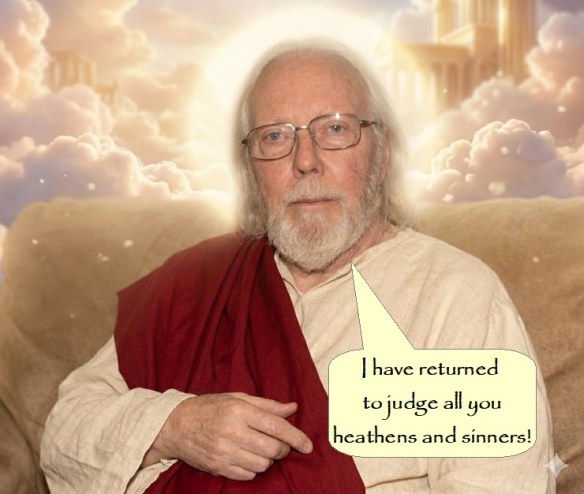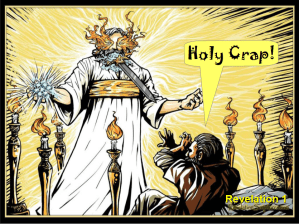
He’s back! After all this time, Jesus has returned! He came through the clouds the other day to judge us and save us from our sin and ignorance!
Oh wait… it’s not Jesus. It’s Don. Yes, Don’s back, eager to rescue us from ourselves. That’s almost as good as JC making a long overdue appearance, don’t you agree?
Let’s see what the sage has to say this time. He commented on three posts: Racism? What Would Jesus Do?, Conversion Porn and Falling By The Wayside. I’m not going to address his comment on Falling By The Wayside as it’s merely a plug for his own blog, something I’ve previously asked him not to do. His other two comments are below. All typos, leaps of logic and condescension are in the originals.
First his response to Racism? What Would Jesus Do?:
A alwaysNeil, you display a particularly poor knowledge of he N.T. and a surprisingly poor ability to read a text given you are a literature guy. You should know, though perhaps it was not part of the curriculum, that any chunk in a text is connected to all the rest and should be read with that in mind. And you should know that there is a cultural and historical context to every piece of writing. You wouldn’t read Tale of Two Cities without considering those, right? Why read Matthew in bits and pieces, then?
Thanks Don, I do know how to read a book, but like you I focus on a particular section when constructing a blog post. Just like preachers do when preaching, just like the set readings do in the liturgy, just like Christian bloggers do. Just like you do, in fact. You do exactly this in the post for which you sent the link. Why do you do that? Don’t you know how to read a book?
All the same, I do set what I say in Racism? What Would Jesus Do? in context: the milieu in which Jesus and his scriptwriters existed. For example, I say, ‘Many of Jesus’ admonishments were written by cultists anticipating the end of the age for members of their own group; they were all too happy to lash out at those who weren’t part of it.’ We know this from the way NT writers address dissidents (‘anti-Christs’), Jews (‘children of the devil’ etc) and those they saw as opponents (‘evil-doers’, ‘dogs’). I also referenced the racism Jesus exhibits in the other gospels. Did you miss this? Do you not know how to read?
Your ‘argument’ is actually nothing but that old chestnut, ‘you took it out of context’. So tell me, Don, what would Jesus’ unpleasantness look like if it were in context as you might define it? Of course you don’t actually tell us how you define it: are you talking about the surrounding verses? The chapter? The whole gospel? The entire New Testament? The Bible from beginning to end? Would Jesus’ behaviour be any more justifiable in these ‘contexts’? Would you be able to excuse it more easily? Do tell us how a wider context would change what Jesus says.
Next, Don passes judgement on Conversion Porn:
Greetings Neil. It jewels to me from your tone, you have reached the bottom of the barrel. So let me give you some more conversion porn.
Richared Bransford, Air Force surgeon who after his toru went to Africa with African Island Mission and spent 30+ years building hospitals and medical clinics and training African medical personnel across east africa. And worked himself in surgery where I visited him in the early 90s. He didn’t write a book or get rich.
Corrie ten Boom. prisoner of the Nazis who lived (her family did not) to tell about how God changed her to love her captors and went on to tell how God made her a new person through her painful imprisonment. Yes, she wrote a book. The Hiding Place.
Harriet Tubman, a slave, who escaped and helped many, many of her fellow negro slaves find freedom. She did not write a book or get rich, though many books have been written about her and a movie was made more recently.
Eric Liddell, olympic runner and missionary to China where he served the poor and where he died in a Japanese internment camp in 1945. Poor I might add. He wrote no books and made no movies, though there have been those made about him.
These are some of the well-known followers of Jesus. Add to them many thousands who worked in rescue missions for nothing, who served as nurses, as my wife did, with no recognition, who fought slavery, who went to India, as my daughter did, to create homes for rescued traffic girls, who build homes for homeless people, as I have done, at their own cost. No one will ever know of them.
What about them, Neil? They believed the “conversion porn” and made a difference in the world.
Don, most of these examples are the same ones trotted out 55 years ago when I was a young Christian. No doubt these individuals did remarkable things, and ‘Richared’ Bransford too. But they’re a select few out of the millions of Christian converts in the hundred years since Eric Lidell. What about all those others? What did they all do? And what about the non-Christians who achieved as much?: Oskar Schindler, Nicholas Winton, Chiune Sugihara, Malala Yousafzai, Chen Shu-chu, Lou Xiaoying (look them up). And, seeing as we’re including people known to us, the young atheist surgeon, the daughter of a friend of mine, who has spent years now in African hospitals working for nothing, despite being diagnosed with cancer herself (now recovered, thanks to medical science, not Jesus).
You see, Don, you’ve selected half a dozen remarkable individuals out of millions without considering the context. Statistically, your examples are insignificant. Maybe most of them didn’t make money from writing books or otherwise cashing in on their service but as I noted in the post, there are certainly those who do. We all know of the many preachers and evangelist who are multi-millionaires. You’ll no doubt say these are not True Christians™, so should be disregarded. Except… they can’t be; they are Christians and they’ve done very well off the back of it. Conversion porn, indeed.
Don, if you’re back to commenting, bear in mind that you won’t get off as lightly this time as you did a couple of years back. I’m not going to put up with your sly ad hominem remarks, your limited, narrow perspective of the Bible, your evasiveness and condescension and your shoddy promotion of Jesus. Comment at your peril.






 This is not the scheduled post. I’ve shelved that for the time being for fear of nasty repercussions. I don’t believe it was inflammatory; in fact, it was well researched and perfectly reasonable. However, as all theistic religions are barbaric at heart, with followers and supporters prepared to take radical action in defence of their particular man-made deity, I’m not prepared to take that risk just yet.
This is not the scheduled post. I’ve shelved that for the time being for fear of nasty repercussions. I don’t believe it was inflammatory; in fact, it was well researched and perfectly reasonable. However, as all theistic religions are barbaric at heart, with followers and supporters prepared to take radical action in defence of their particular man-made deity, I’m not prepared to take that risk just yet. WordPress has changed the way in which blogs are created and posted. They added an alternative way of doing it about two years ago, called Block Editor, which I and many others found difficult to use. There was however the ‘old’ system, which WordPress dubbed ‘Classic Editor’, to fall back on and continue using. This I’ve been doing, occasionally dropping into Block Editor to see if the bugs have been ironed out. No doubt WordPress doesn’t regard these as bugs but missing tabs for adding pictures and hyperlinks, and the absence of a Schedule button for setting the publication date sure seem like it to the user. I can never find them in Block Editor (see the screenshot below for how helpful it looks) and while these same features are inclined to relocate themselves in Classic Editor too, at least they’re there somewhere!
WordPress has changed the way in which blogs are created and posted. They added an alternative way of doing it about two years ago, called Block Editor, which I and many others found difficult to use. There was however the ‘old’ system, which WordPress dubbed ‘Classic Editor’, to fall back on and continue using. This I’ve been doing, occasionally dropping into Block Editor to see if the bugs have been ironed out. No doubt WordPress doesn’t regard these as bugs but missing tabs for adding pictures and hyperlinks, and the absence of a Schedule button for setting the publication date sure seem like it to the user. I can never find them in Block Editor (see the screenshot below for how helpful it looks) and while these same features are inclined to relocate themselves in Classic Editor too, at least they’re there somewhere!


